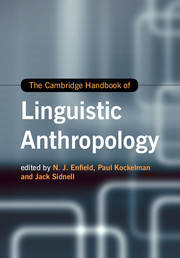Book contents
- The Cambridge Handbook of Linguistic Anthropology
- Series page
- The Cambridge Handbook of Linguistic Anthropology
- Copyright page
- Dedication
- Contents
- Figures
- Tables
- Contributors
- 1 Introduction
- Part I System and function
- Part II Process and formation
- 8 Language acquisition and language socialization
- 9 Language, society, and history Towards a unified approach?
- 10 Language emergence
- 11 Endangered languages
- 12 Language evolution
- 13 Causal dynamics of language
- Part III Interaction and intersubjectivity
- Part IV Community and social life
- Part V Interdisciplinary perspectives
- Index
9 - Language, society, and history Towards a unified approach?
from Part II - Process and formation
Published online by Cambridge University Press: 05 October 2014
- The Cambridge Handbook of Linguistic Anthropology
- Series page
- The Cambridge Handbook of Linguistic Anthropology
- Copyright page
- Dedication
- Contents
- Figures
- Tables
- Contributors
- 1 Introduction
- Part I System and function
- Part II Process and formation
- 8 Language acquisition and language socialization
- 9 Language, society, and history Towards a unified approach?
- 10 Language emergence
- 11 Endangered languages
- 12 Language evolution
- 13 Causal dynamics of language
- Part III Interaction and intersubjectivity
- Part IV Community and social life
- Part V Interdisciplinary perspectives
- Index
Summary
Keywords
- Type
- Chapter
- Information
- The Cambridge Handbook of Linguistic Anthropology , pp. 227 - 249Publisher: Cambridge University PressPrint publication year: 2014
- 1
- Cited by

